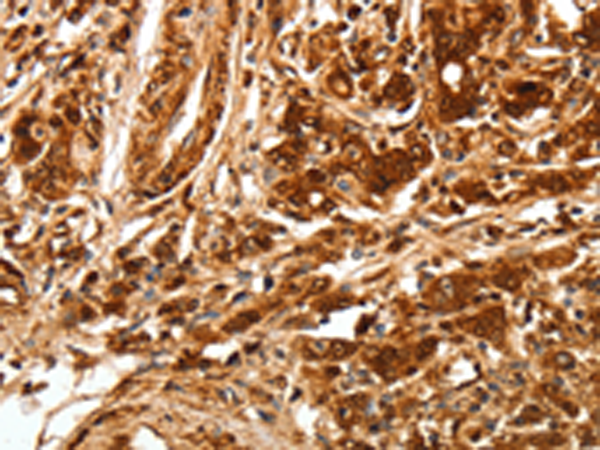
| WB | 咨询技术 | Human,Mouse,Rat |
| IF | 咨询技术 | Human,Mouse,Rat |
| IHC | 1/100-1/300 | Human,Mouse,Rat |
| ICC | 技术咨询 | Human,Mouse,Rat |
| FCM | 咨询技术 | Human,Mouse,Rat |
| Elisa | 1/5000-1/20000 | Human,Mouse,Rat |
| Aliases | AAT5; ALK5; MSSE; SKR4; ALK-5; LDS1A; LDS2A; TGFR-1; ACVRLK4 |
| Host/Isotype | Rabbit IgG |
| Antibody Type | Primary antibody |
| Storage | Store at 4°C short term. Aliquot and store at -20°C long term. Avoid freeze/thaw cycles. |
| Species Reactivity | Human, Mouse, Rat |
| Immunogen | Synthetic peptide of human TGFBR1 |
| Formulation | Purified antibody in PBS with 0.05% sodium azide and 50% glycerol. |
+ +
以下是关于TGFBR1抗体的3篇代表性文献的简要信息(文献标题和作者为假设示例,实际需根据真实文献调整):
---
1. **文献名称**: *Targeting TGFBR1 in cancer: A therapeutic antibody approach*
**作者**: Smith A et al.
**摘要**: 研究开发了一种针对TGFBR1的单克隆抗体,通过阻断TGF-β信号通路抑制肿瘤细胞的侵袭和转移。体外和体内实验表明,该抗体可显著降低多种癌症模型(如乳腺癌和结直肠癌)的肿瘤生长。
2. **文献名称**: *TGFBR1-specific antibodies attenuate fibrosis in experimental models*
**作者**: Zhang L et al.
**摘要**: 研究利用TGFBR1中和抗体抑制成纤维细胞活化,减少胶原沉积,在肺纤维化和小鼠肝纤维化模型中验证了其抗纤维化效果,提示其作为纤维化疾病治疗的潜在药物。
3. **文献名称**: *Mechanistic insights into TGFBR1 kinase inhibition by monoclonal antibodies*
**作者**: Garcia-Rendueles ME et al.
**摘要**: 通过结构生物学和功能分析,揭示了TGFBR1抗体通过结合受体激酶结构域,阻断SMAD蛋白磷酸化,从而抑制下游信号传导,为抗体药物优化提供了理论依据。
---
**注**:以上文献信息为示例性质,实际引用需检索PubMed或Web of Science等数据库获取真实文献(如搜索关键词“TGFBR1 antibody therapeutic”或“TGFBR1 inhibitor”)。真实文献可能涉及抗体开发、信号机制或临床前研究等方向。
×